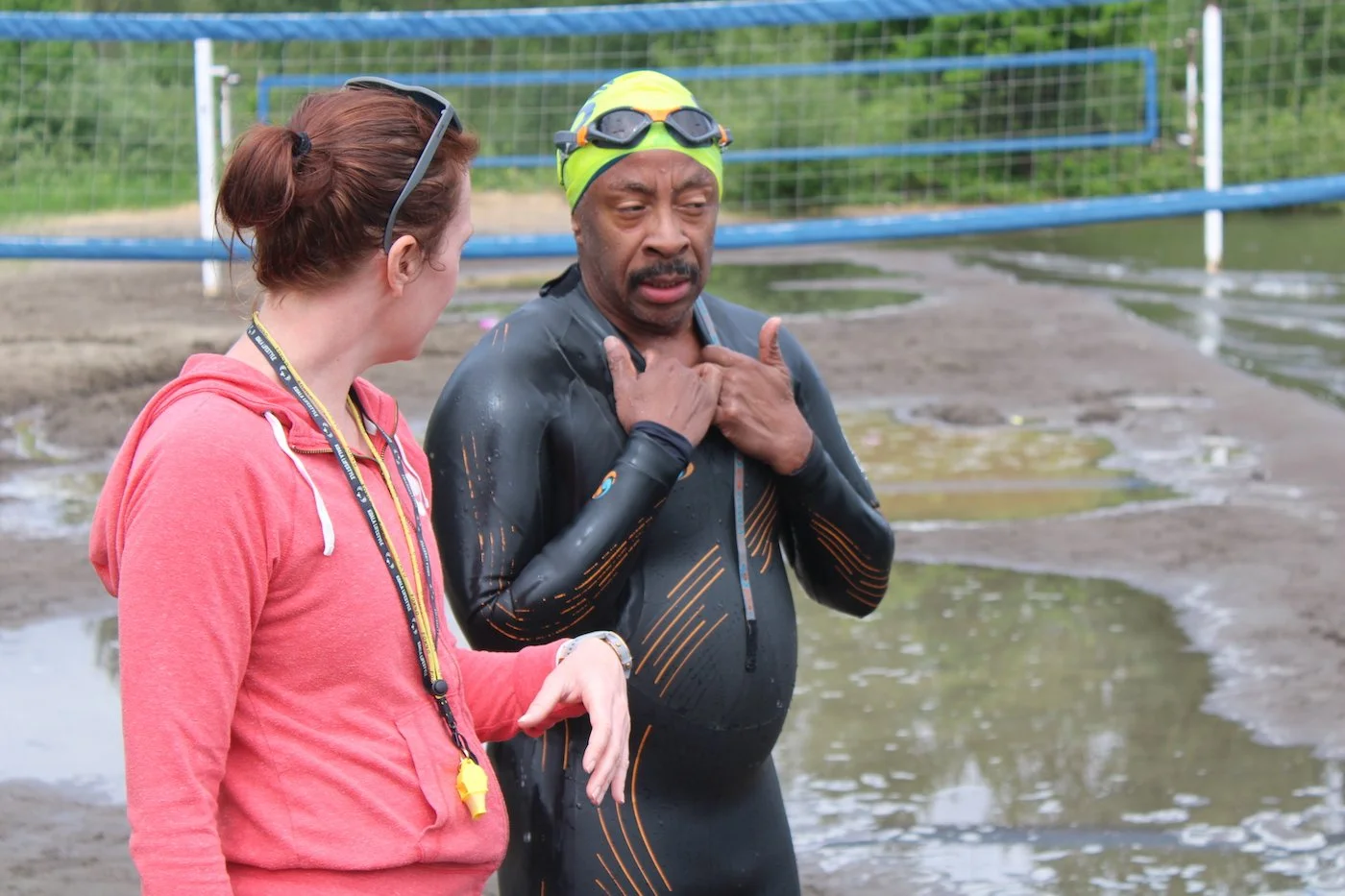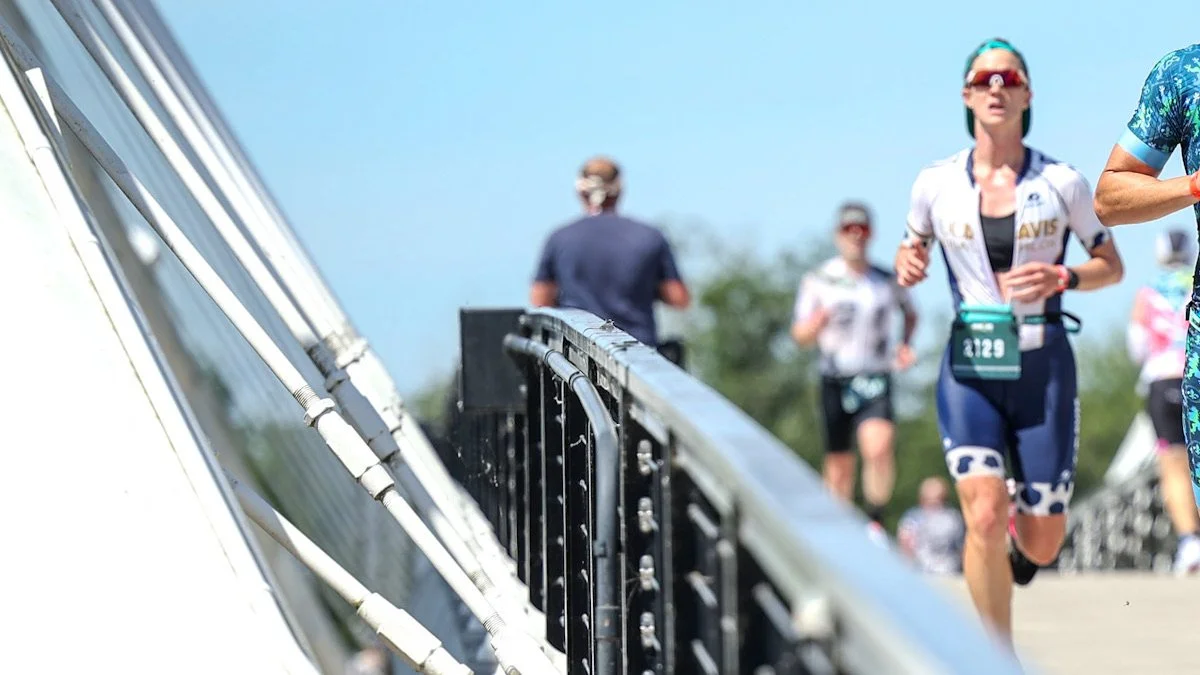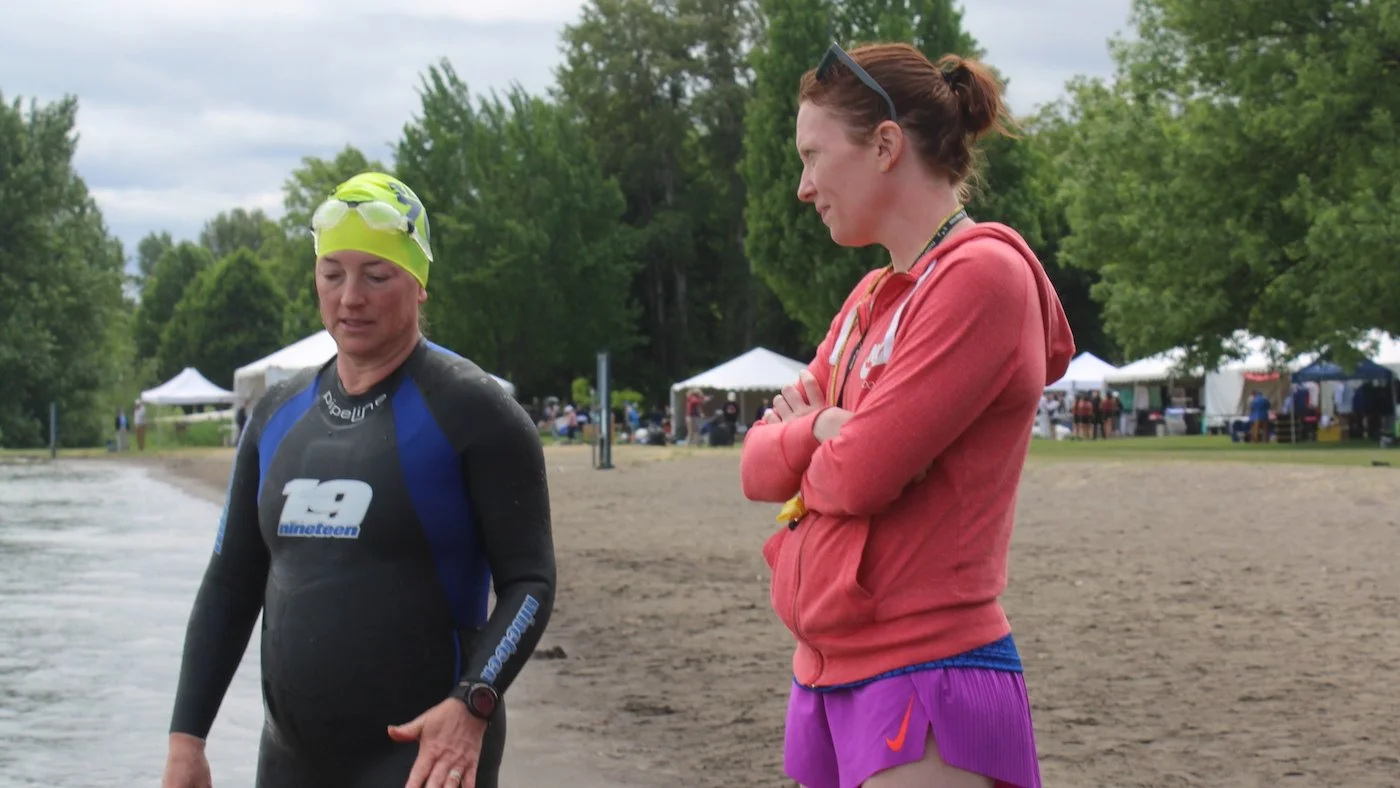IT’S NOT ABOUT IMPRESSING YOUR COACH
The coach-athlete relationship is crucial in sport—let’s make sure yours is working
by Chris Bagg and Molly Balfe
Julie was having a difficult race. She’d signed up for her first middle distance event last September, after an exciting and engaging first year in triathlon during which she’d completed two sprint-distance races and an Olympic-distance race. She had surprised herself in that third, slightly longer race, discovering that as the event lengthened, she had more endurance than the athletes around her, and she’d finished in the top five in her age group. She’d been ecstatic, and had seen her coach be surprised and pleased, too. The two of them planned a new season in which Julie would step up to a half-ironman. Julie and her coach seemed well-suited to each other, and one of Julie’s most powerful memories of her final race from last season was getting an all-caps text message from her coach that read: “THAT WAS AMAZING I AM SO PROUD OF YOU!”
This season started on the same good front foot: Julie took a small break in December and then got back to work on January 3rd, the first Monday of the year. Julie and her coach crafted a plan that would continue to build on Julie’s natural strength (endurance) while also addressing some weaknesses: swim technique and raw speed on the bike and run.
Life, though, had some other plans. Julie and her partner were in the middle of selling a house; their son had just entered first grade and seemed to be struggling with the transition; Julie got a promotion to a management position (yay!) only to discover that she missed the hands-on work of her previous job (boo); the hours for a half-ironman, seemingly so achievable during those excited days last September, felt daunting and out of reach, now. Julie began getting up earlier and earlier to work out, and her sleep was beginning to suffer. Her TrainingPeaks app, which last summer looked like a sea of green, now looked like a stoplight on the fritz: equal parts red, yellow, and green. She was missing workouts or struggling to complete them in the manner her coach scripted.
Julie has been an achiever her whole life. As the missed or incomplete workouts piled up, she started to miss conversations with her coach, and stopped commenting on her training sessions. Her coach, concerned, reached out to Julie, and their connections would get Julie moving for a few days before the pattern resumed. Julie, enervated and exhausted, eventually stopped communicating altogether.
“I’ve just got to get through this race,” she told herself and her partner. “Then I’m sure things will stabilize again.”
On race day, Jullie swam well, and she came out of the water imagining another text message from her coach celebrating her achievement. Maybe I can just get through this, she told herself as she mounted the bike for the 56-mile journey, a lumpy course through the Idaho countryside. It was a cooler day, so she didn’t feel the need to drink too much, and she felt good. She pushed the pace a bit and was excited to see that she was catching other athletes in her age group.
Then something changed. The clouds parted and the wind picked up. The second lap of the bike felt much, much harder than the first half of the ride. I better start drinking something, Julie said, remembering something her coach had said a few weeks earlier about hydration being the most important part of any endurance event. She started drinking, but the sports drink in her bottles tasted stale and warm. A few athletes she had passed an hour before re-passed her. What is my coach going to think? Julie thought. She could see her power numbers and heart rate beginning to fall, which didn’t seem promising. Ever the optimist, though, she looked forward to the run, which had been her sport in high school and remained a strength in this new world of triathlon.
Julie came off the bike and instantly realized something was wrong. Her legs felt rubbery and weak; her breathing was labored; her mind was foggy. Caffeine, she thought. Caffeine will help. She put down an espresso gel, hating the flavor, and stopped at the first aid station to drink some cola. A few minutes later her brain cleared enough to let another message come through: something was wrong with her stomach. Her gut felt sloshy and unkempt. Must be the coke, she thought. I probably shouldn’t put anything else in there. She felt something else, too: a real need to use the bathroom, so she stopped at the next aid station to use the porta-potty. Julie headed back out into the now blisteringly hot day under the Idaho sun, gut shutting down and legs wobbling. By mile six she was walking, dreading the text message she imagined her coach would send this time.
Your Coach is NOT an Approval Figure
Does any of the above sound familiar? We’ve drawn a fairly worst-case scenario, but one that is familiar to us as coaches. If we were teaching this in a classroom setting, we’d ask “What do you all think Julie could have done differently to get a better outcome?” We can imagine many different answers you all would have come up with, many of them very likely correct or applicable to Julie’s situation: time-management strategies, re-prioritizing other aspects of her life that she hadn’t expected would be stressful, realizing that this year wasn’t going to be the year for her first half-ironman.
But endurance athletes, by their very nature, tend to be stubborn and outcome-oriented. They very often have been praised for their achievements, and the concept of renegotiating a commitment can feel like failure to these Type-A folks. There’s nothing wrong with being Type-A (and that personality description is fairly crude anyway), but in this context it may have been working against Julie. What we see is a situation in which Julie and her coach didn’t navigate the nature of their relationship correctly. Neither of them did anything “wrong,” but they may have been able to set it up better. Julie loved that message she had gotten from her coach after that successful Olympic-distance race—she felt some of those welcome feelings of praise from high school she’d felt as a good runner and a good student, and that outcome of pleasing her coach, making her proud, became the goal she aimed for. Unfortunately, as it sometimes does, life had other plans. When other commitments began to get in the way of triathlon, instead of talking to her coach about it, Julie assumed that missing workouts would disappoint her coach, and she began to hide, with the results we saw above.
As a coach, pride is a double edged sword. It feels good for both us as coaches and for our athletes when we say that we’re proud of them—it’s one of the joys of coaching. “I’m proud of you,” though, can also put in place a power hierarchy, with the coach functioning as an approval figure, and if that message isn’t cleared up quickly, it can begin to work on athletes in unhelpful ways. How, then, can we be proud of our athletes, give them the approval they deserve for their work, while NOT setting ourselves up as the people holding the purse strings of pride?
The Coach is the Employee
This is a crucial truth. You, the athlete, HIRED your coach. You pay them. YOU are the boss, and the coach is the employee. Sure, they have expertise you don’t—that’s why you hired them. Their role, however, is to SERVE, not to lead. Making sure both of you are on the same page about this is important to establish early on. When both of you have internalized this fact, it can keep the power balance between the two of you more even. Good bosses still desire the regard and respect of their employees, but less their employees’ approval and pride. Good bosses also talk to their team when they as leaders are having trouble staying on top of the projects they are all responsible for—who hasn’t had a boss who seemed to try to do everything and never ask for help? It’s a dispiriting and demoralizing position for the employees, who usually just want to help. Most of our imaginary situation could have been avoided with a simple conversation between coach and athlete. Julie could have asked her “employee” for help. The coach/employee, who has set up her life to be a helper and supporter, would have been thrilled. The two of them could have worked out some solutions and discovered the fact that Julie had set her coach up as the giver/withholder of approval, all without the coach’s knowledge!
At Campfire, we have all told our athletes that we are proud of them. We’ve used the hashtag #proudcoach in social media after our athletes do amazing things. But we also have always made it clear to our athletes that that pride is about the athlete’s management of their effort, attitude, and process, NOT about the outcome of their event. Outcomes and results are ephemeral, and the thing any coach should want is the development of their athletes as people: applaud the effort and the attitude first, while reminding the athlete that the outcome is a direct result of the fact that they focused on the process.
Beware Coaches Who Function as Approval Figures
We’re already going long here, so we’re gonna keep this particular section a little tighter. You will encounter, in your time in this sport, coaches who cultivate themselves as approval figures. They talk about themselves and their accomplishments first instead of focusing on the accomplishments of their athletes. They withhold approval as a tactic. They don’t tell athletes their process for improving their skills (usually because they don’t know and don’t care to learn the actual expertise). They look for athletes who hunger for approval and encourage that hunger. They are hiding their lack of responsible coaching behavior behind a wall that has painted on it: “DO AS I SAY AND YOU WILL GET MY APPROVAL.” When things go wrong in a race, these coaches try to find things the athlete has done wrong, suggesting that in the next cycle the athlete simply needs to try harder and do better. This approach is abusive and gaslighty—the coach is trying to make the athlete feel that they are the ones who are in the wrong, and if they change, then maybe—just maybe—they’ll get the coach’s approval. How do you spot these coaches? Look at how they market themselves and how they coach: if most of their presence is about themselves, if they use the workouts that “worked for me when I was racing,” if they over-praise in some cases and withhold praise in others, you are likely dealing with one of these cult of personality coaches. STEER CLEAR.
Three Questions For You and Your Coach to Ask Each Other
Finally, how do you spot the coaches who want to be great coaches, that is, people who live to serve and support their athletes? If they are willing to have a conversation with you, admit when they make a mistake (and promptly change their behavior), if they ask questions about YOU and how you work, if they are focused on process, effort, and attitude, you’ve probably got someone you want on your endurance team. Here are some sample questions for you both to ask each other:
Athlete: “How do you define success in your work with athletes?”
Coach: “Tell me about what kind of encouragement helps you be successful.”
Athlete: “What is a misunderstanding that you and an athlete have had but have been able to work through effectively?”
Coach: “What do you want to be able to say you accomplished at the end of this season? What about five seasons from now?”
Athlete: “What expectations do you have of me as an athlete? What can I expect from you as a coach?”
Coach: “What do you LOVE about being a triathlete/runner/cyclist/swimmer/skier/endurance athlete? Why do you keep pursuing this sport?”
Great Outcomes Come From Great Collaborations
Julie dreaded talking with her coach after her race, but her coach called her afterward and said “Hey, that must have been a really tough day—do you want to talk about it?” Julie, deeply dehydrated and emotionally drained, started to cry a little. “I didn’t want to disappoint you,” Julie said. “I’m so sorry.” “You don’t ever have to apologize to me about your races, Julie,” her coach said. “Working together isn’t about you disappointing me or making me proud. I’m so impressed that you stayed out there and finished, even though you were having a tough day on the race course. Let’s sit down this week in person or on the phone and come up with some different approaches we could have tried, and then let’s strategize about how to put those into place for the next race, yeah? I have a feeling that this is still a challenge you’re excited about overcoming. But remember—this is a challenge we do together. I’m not waiting on the other side of it to tell you you did great; I’m right here next to you.”
A year later, having worked together to figure out how to navigate a busier life, Julie returned to that lake in Idaho and completed her second half-ironman, this time running strong all the way to the end. It felt amazing. Her coach sent her a message: “I think it’s amazing the way that you dealt with that adversity over the last year and I hope you’re feeling proud of yourself—I’m certainly proud of the way you showed up today.” Julie took a few seconds, standing there with her finisher’s medal in one hand, a half-drunk sports bottle in the other, sweat streaming down her body, and she realized that she did, in fact, feel proud of herself, and that feeling was coming from within.






